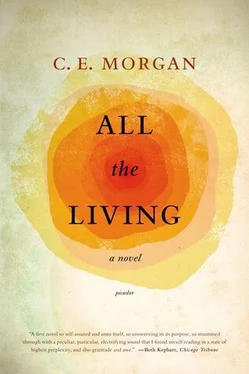You want something to drink? she said and he nodded, his face looked rained upon from sweat. In the kitchen she made lemonade from a mix, stirring it until the vivid yellow sediment fanned and dissolved. She poured it into a tall glass and with the glass in her hand, she went out back again and found him sitting on the lowered tailgate of his truck, his boots not touching the ground, the triangulated tips pointed down. He made sounds under his breath, inchanting so soft she almost didn’t hear it, almost mistook it for breathing.
What’s that you’re singing? she said. She sat beside him and held the glass in her hand for a moment, the icy wet hoop ice-branding the palm of her hand.
Nothing, he said.
No, what?
He shook his head.
Tell me…
He turned his head fractionally away and said, with no tune, When I was sinking down, sinking down, sinking down. You know it, he said, a sideways glance to see if this was the case, his lip twisted down in apology.
Sing it, she said.
I can’t sing, he said.
No, just sing it more. So he sang in a soft and artless voice, And when from death I’m free, I’ll sing on, I’ll sing on, and when from death I’m free, I’ll sing on. The graveled pitches fought to escape his throat, but they could not rise and the unchurched sound of his voice was thin and breathed through like wind in cane.
Yes, she said and she wagged her finger before him as if she were pulling the words from his mouth with her hand.
And when from death I’m free, I’ll sing and joyful be and—
He could not see that she was smiling at him because he had turned his face again into the falling sunlight on his right side, into the west.
— and through eternity, I’ll sing on.
I’ll sing on, she sang, her voice clear. And through eternity — but he only hummed the rest under his breath.
Yes, she said again. The sound fell away, words fallen short of their pitches, unable to form a melody, and she was left to study that side of his face. His loose curls reddened from the sun and also the granitic edge of his jaw, the hint of paler skin under his jaw and the cording of his neck. She watched the muscles in his throat work as he swallowed once. The edge of his turned face was lit then like the nimbic burning line of a cloud, so fine and bright that she turned her gaze away and saw then a flock of birds, barn swallows from the look of them but too far away to tell for sure, that had risen up in a chorus and taken to the air. They flew out together in what was a strange and shifting shape over the tobacco field, out and up, thinning for a moment so that they were no more than a blade in the sky and then swooping down now, lost in the distant shadow of the mountains. She looked at Orren again and raised her hand to point as if to say, Look what was showed us, but Orren was still turned away, the radiance of his face hidden. Aloma let her hand remain in the air for a moment and when she looked back to the birds, they were gone. She sighed, felt the unmoving weight of Orren beside her. She leaned into him just barely so their shoulders touched.
Sing it again, she said softly.
Come on, now, was his only reply, folding his cracked dry hands, one over the other between his knees, his shoulders hunched. He stayed sitting beside her looking out over the land to the west while she turned her head away with a deeper sigh and squinted into the darkening east as though searching for something. And she thought to herself with a bitterness she did not recognize because she’d not felt its tannins on her heart before, No, I will not tell him about the tree today. And maybe not any day.
After she had been playing at the church for a few weeks, Aloma felt she would be welcome to come in during the weekdays to practice piano. She wanted to leave the big house, its common graceless interior that she’d ordered but no longer wanted to master. She dreamed once or twice that it fell down while they slept and she’d woken with a start, but it was still there all around her, still strange and unchanged. She had not lost the desire to resurrect some of her better pieces to use as audition material to get into a piano program. Just as she’d always planned before she’d followed Orren. Or, if nothing else, just to hear the old music again, to remember what it was like to sit beside Mrs. Boyle with the eye of the woman on her every move, a strict attention. It had stirred her to be seen. So she decided. She abandoned the house — her cleaning, her organizing, her standing at the back door gazing dull and dry-eyed into the fields where Orren might or might not be found — and drove in to practice. The first time she went to the church it was noon. The front door was locked and dark and she stood before the peeling white doors for a few minutes like a child, her back to the road, wondering if Bell Johnson might show up. When he did not, she slouched to her truck and drove home.
She called him that night, when she was sure he would be home, and said, Do you think I might could come by the church to play tomorrow?
Well, he said, we keep it locked up during the day unless Mother’s there cleaning. I run our farm during the day, mostly, but I go in generally from four to six and you’re welcome to come by any time then.
The next day she pulled into the lot exactly at four and Bell Johnson did the same. He waited politely for her to get out of her truck, and when she reached for her box of scores, he took them from her. She did not protest, but followed behind him and was shied slightly by the fact that he wore jeans and an old festival tee shirt and looked younger a bit than he was.
What’s all this in here? he said.
It’s my scores, she said.
Sheet music.
Yeah, from when I played all the time at school.
What school was that? he said and put the box down by the piano and turned to her with his hands on his hips.
Just a settlement school east of here, she said and squatted down by the box, her face tilted slightly away to deflect further questions. She took the lid off the box and felt him towering over her, watching her.
You played all that? he said, looking over her shoulder. Mozart, huh. Alright, he said. Well. He took a step away from the piano. I got a little office off the kitchen. If you need a thing, don’t hesitate.
For a moment more, he did not move. She smiled up at him — just for a second — and he, feeling that the conversation could not go further, but not knowing why, left. Then she pulled the first score from the box and spread it on the rack of the piano, her heart beating. She looked up at the door Bell had closed behind him. She hesitated, her hands hovering above the keys. Then she played. And she played, not with the smoothness that she’d possessed two months ago — the last time she’d played from any of the scores — but with a surging and unsteady need that had not been there before. As her fingers found their home, clumsy at first but quick to confidence, her body rocked back and forth unaware on the bench like a child finding its comfort. She played and played.
So she came four times a week to practice, not including Wednesday, and she practiced the old music, the Grieg and Schumann, the Bach she played badly but loved, Beethoven and Liszt, and she thought how much she had missed all this. And she thought too how Orren did not know this part of her, he’d not once seen her play piano, she believed he didn’t know what she was capable of. Who she could be.
Bell met her every day at the front door. He learned quickly that she would always come on time so he was sure never to be late and he waited on the front steps until she turned into the lot and then he stood and tossed his keys lightly in his hand. Once her pattern was established, it was always like this and he was always there. But once he let her into the building and was polite — he was always polite, but nothing more — he disappeared into the back and she played until six when she left without seeing him again. He stayed in his office and she knew he heard her, because her playing crashed through the small sanctuary and the walls were paper-thin. After a week and a half of this, she was restless. So one day, not thinking it unwise, not really thinking anything about it at all, she went to the office and peeked her head around the door, saw him sitting at a desk with his Bible spread open before him, a pen lolled between two thickly made fingers. She said, So this is where you work. She had caught him by surprise and he looked up, startled. Then he sat back on his chair and brought his hands together, clasping the pen over his belly. He smiled, looking up at her face tilting forward and gleaming from the door frame that she gripped. Expectation perched in the set of her lips.
Читать дальше
Конец ознакомительного отрывка
Купить книгу











